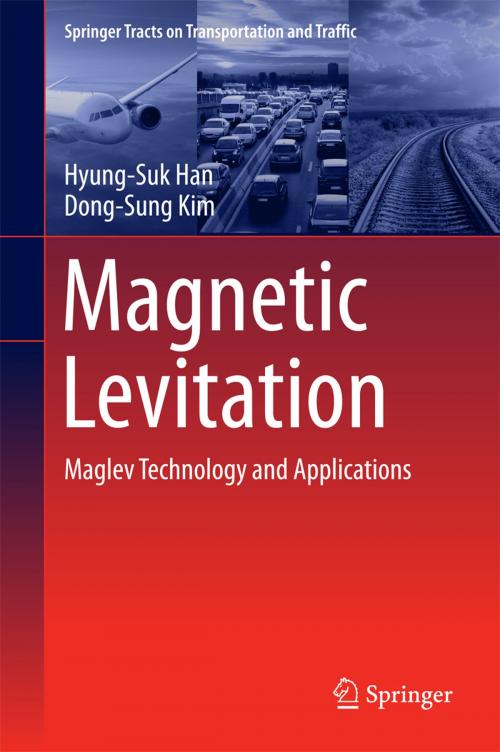Magnetic Levitation
Maglev Technology and Applications
Nonfiction, Science & Nature, Science, Physics, Magnetism, Technology, Machinery| Author: | Hyung-Suk Han, Dong-Sung Kim | ISBN: | 9789401775243 |
| Publisher: | Springer Netherlands | Publication: | January 2, 2016 |
| Imprint: | Springer | Language: | English |
| Author: | Hyung-Suk Han, Dong-Sung Kim |
| ISBN: | 9789401775243 |
| Publisher: | Springer Netherlands |
| Publication: | January 2, 2016 |
| Imprint: | Springer |
| Language: | English |
This book provides a comprehensive overview of magnetic levitation (Maglev) technologies, from fundamental principles through to the state-of-the-art, and describes applications both realised and under development.
It includes a history of Maglev science and technology showing the various milestones in its advancement. The core concepts, operating principles and main challenges of Maglev applications attempted across various fields are introduced and discussed. The principle difficulties encountered when applying Maglev technology to different systems, namely air gap control and stabilization, are addressed in detail. The book describes how major advancements in linear motor and magnet technologies have enabled the development of the linear-motor-powered Maglev train, which has a high speed advantage over conventional wheeled trains and has the potential to reach speed levels achieved by aircraft. However, many expect that Maglev technology to be a green technology that is applied not only in rail transportation, but also in diverse other fields; to ensure clean transfer in LCD manufacturing, in ropeless high speed elevators, small capacity rail transportation, space vehicle launchers, missile testers, energy storage, and so on. These potential applications and their unique challenges and proposed technological solutions are introduced and discussed in depth.
The book will provide readers from academia, research institutes and industry with insights on where and how to apply Maglev technology, and will serve as a guide to the realization of their Maglev applications.
This book provides a comprehensive overview of magnetic levitation (Maglev) technologies, from fundamental principles through to the state-of-the-art, and describes applications both realised and under development.
It includes a history of Maglev science and technology showing the various milestones in its advancement. The core concepts, operating principles and main challenges of Maglev applications attempted across various fields are introduced and discussed. The principle difficulties encountered when applying Maglev technology to different systems, namely air gap control and stabilization, are addressed in detail. The book describes how major advancements in linear motor and magnet technologies have enabled the development of the linear-motor-powered Maglev train, which has a high speed advantage over conventional wheeled trains and has the potential to reach speed levels achieved by aircraft. However, many expect that Maglev technology to be a green technology that is applied not only in rail transportation, but also in diverse other fields; to ensure clean transfer in LCD manufacturing, in ropeless high speed elevators, small capacity rail transportation, space vehicle launchers, missile testers, energy storage, and so on. These potential applications and their unique challenges and proposed technological solutions are introduced and discussed in depth.
The book will provide readers from academia, research institutes and industry with insights on where and how to apply Maglev technology, and will serve as a guide to the realization of their Maglev applications.















